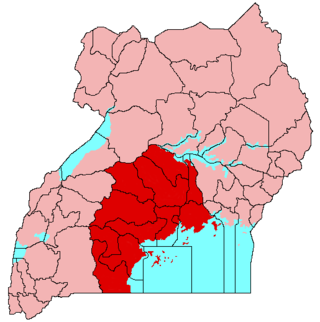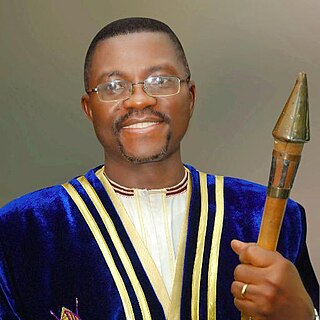Related Research Articles

Kampala is the capital and largest city of Uganda. The city proper has a population of 1,875,834 (2024) and is divided into the five political divisions of Kampala, Kawempe, Makindye, Nakawa, and Rubaga.

Buganda is a Bantu kingdom within Uganda. The kingdom of the Baganda people, Buganda is the largest of the traditional kingdoms in present-day East Africa, consisting of Uganda's Central Region, including the Ugandan capital Kampala. The 14 million Baganda make up the largest Ugandan region, representing approximately 16% of Uganda's population.

Sir Edward Frederick William David Walugembe Mutebi Luwangula Mutesa II was Kabaka, or king, of the Kingdom of Buganda in Uganda from 22 November 1939 until his death. He was the 35th Kabaka of Buganda and the first president of Uganda from 1962 to 1966, when he was overthrown by Milton Obote. The foreign press often referred to him as King Freddie, a name rarely used in Uganda. An ardent defender of Buganda's interests, especially its traditional autonomy, he often threatened to make the kingdom independent both before and after Uganda's independence to preserve it. These firm convictions also later led to conflicts with his erstwhile political ally Milton Obote, who would eventually overthrow him.

Danieri Basammula-Ekkere Mwanga II Mukasa was the 31st Kabaka of Buganda who ruled from 1884 until 1888 and from 1889 until 1897.

Kabaka Ronald Edward Frederick Kimera Muwenda Mutebi II is King of the Kingdom of Buganda. He is the 36th Kabaka of Buganda.
Kimera was Kabaka of the Kingdom of Buganda between 1374 and 1404. He was the third king of Buganda.
Sylvia Nagginda is Queen of Buganda as the wife of Ronald Muwenda Mutebi II.
Ssuuna II Kalema Kasinjo Mukaabya Sekkyungwa Muteesa Sewankambo Walugembe Mig'ekyaamye Lukeberwa Kyetutumula Magulunyondo Luwambya Omutanda Sseggwanga was Kabaka of the Kingdom of Buganda from 1832 until 1856. He was the twenty-ninth Kabaka of Buganda.

King’s College Budo is a mixed, residential, secondary school in Central Uganda (Buganda).

The history of Buganda is that of the Buganda kingdom of the Baganda people, the largest of the traditional kingdoms in present-day Uganda.

Muteesa I Mukaabya Walugembe Kayiira was the 30th Kabaka of the Kingdom of Buganda, from 1856 until 1884.
Buddo, sometimes spelled as Budo, is a hill in Wakiso District, Central Uganda. Phonetically, Buddo is the correct spelling in Luganda, the native language of the local area.
Signed in March 1900, this agreement formed the basis of British relations with Buganda, the Kabaka (King) was recognised as ruler of Buganda as long he remained faithful to her Majesty, the Lukiko given statutory recognition. This was following another agreement signed in 1894 in which the Kingdom of Buganda, then known as Uganda, was declared a British Protectorate.This agreement is also known as the Buganda Charter of Rights and was upheld for more than 50 years.
Banda is a hill that lies in Nakawa Division, within Kampala, the capital of Uganda. Banda also refers to the neighborhoods on the slopes of the hill and between Banda Hill and Kireka, extending all the way to the Kampala-Jinja Highway. The southwestern slopes of the hill are occupied by the neighbourhood known as Kyambogo, and is the location of the campus of Kyambogo University, one of the nine public universities in the country.

The Kasubi Tombs in Kampala, Uganda, is the site of the burial grounds for four kabakas and other members of the Baganda royal family. As a result, the site remains an important spiritual and political site for the Ganda people, as well as an important example of traditional architecture. It became a UNESCO World Heritage Site in December 2001, when it was described as "one of the most remarkable buildings using purely vegetal materials in the entire region of sub-Saharan Africa".

The Baganda also called Waganda, are a Bantu ethnic group native to Buganda, a subnational kingdom within Uganda. Traditionally composed of 52 clans, the Baganda are the largest people of the Bantu ethnic group in Uganda, comprising 16.5 percent of the population at the time of the 2014 census.

The Bulange (boo-lah-ngeh) is a building in Uganda. It houses the Lukiiko (Parliament) of the Kingdom of Buganda. The Kabaka of Buganda and the Katikkiro of Buganda also maintain offices in the building. The building serves as the administrative headquarters of the Buganda Kingdom.

Charles Peter Mayiga is a Ugandan lawyer, cultural leader and author and business man. He is the current Katikkiro of Buganda kingdom, a constitutional monarchy in present-day Uganda. He was appointed to that position by the reigning Kabaka of Buganda, His Majesty Muwenda Mutebi II of Buganda, in May 2013, replacing Engineer John Baptist Walusimbi.

CBS FM Buganda is a Luganda radio channel in Kampala, Uganda.
Wanyange Girls School is a girls' boarding government-aided secondary school on Nyange hill in Jinja District of the Eastern Region, Uganda. It was founded in 1960.
References
- ↑ Nicholas Wassajja (27 August 2019). "Thank you for wonderful work, Kabaka to Nnabagereka". New Vision . Kampala. Retrieved 5 June 2020.
- 1 2 John Roscoe. The Baganda. London: Frank Cass.
- ↑ Conrad Ahabwe (15 April 2019). "Nabagereka Blasts Government For Neglecting Health Sector At Her Father's Funeral". Kampala: PML Daily. Retrieved 5 June 2020.
- ↑ Buganda Kingdom (5 June 2020). "Nnabagereka Development Foundation (NDF)". Mengo, Kampala: Buganda Kingdom Official Website. Retrieved 5 June 2020.
- ↑ "A decade long journey of King Philip Olarker Rauni III – Kingdom Post" . Retrieved 2024-05-20.